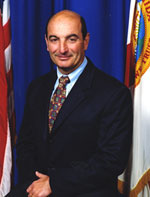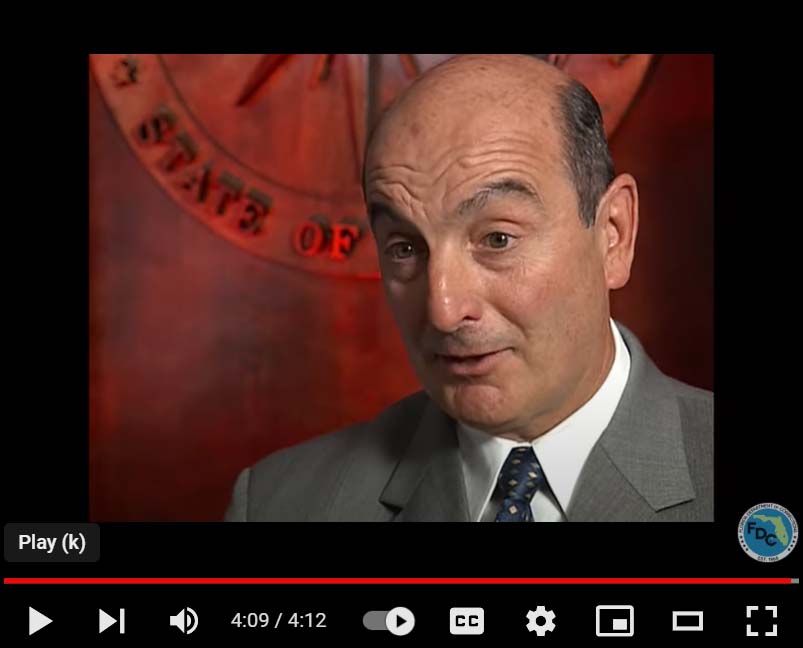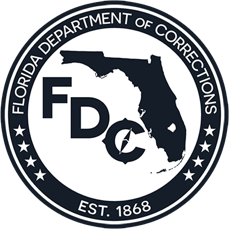2006
OFFENDER POPULATION JUNE 30, 2006
INMATES: 88,576
SUPERVISED: 146,182
INMATES: 88,576
SUPERVISED: 146,182
GOVERNOR BUSH ASKS SECRETARY CROSBY TO RESIGN
"Today, I asked for, and received, the resignation of James Crosby, Secretary of the Florida Department of Corrections. I am deeply saddened and disappointed at the need to take this action," Bush said in his statement. In response, Crosby thanked Bush for "allowing me to serve. I have greatly enjoyed serving under your tremendous leadership and working with a first class group of colleagues."
Crosby would later be convicted of accepting $130,000 in kickbacks from a contractor who provides snacks to the prison visiting park canteens, and he is sentenced to eight years in federal prison. His partner in crime, former Regional Director Allen Clark, would get 31 months in federal prison for the same crime. Clark’s sentence was more lenient because he had cooperated with authorities and willingly taped conversations with his former friend and employer, which were then used to help prosecute Crosby.
Click here to listen to Secretary McDonough tell how he learned he was to be the next Secretary of the Department of Corrections under these very unusual circumstances.
GOVERNOW BUSH NAMES COLONEL JAMES R. MCDONOUGH INTERIM SECRETARY

Secretary
James R. McDonough
Governor Bush immediately names Colonel (Ret.) James R. McDonough as Interim Secretary. Prior to this appointment, McDonough served as Director of the Governor’s Office of Drug Control, and from 1996 to 1999 he was Director of Strategy for the Office of National Drug Control Policy, the White House agency that leads the nation’s efforts to reduce drug abuse and its consequences.
A graduate of the Massachusetts Institute of Technology and the United States Military Academy, McDonough concluded his extensive Army career with assignments in Africa (Rwanda, Zaire, and Uganda) and the Balkans (Bosnia). During his military career, he was awarded three Bronze Stars (one for valor), the Purple Heart and the Distinguished Service Medal, among others. He also served as an associate professor of political science and international affairs at the U.S. Military Academy, as an analyst with the Defense Nuclear Agency, and as a detailee with the U.S. State Department.
 Click here to hear Secretary McDonough talk about his background and his first day on the job as the new Secretary of Corrections.
Click here to hear Secretary McDonough talk about his background and his first day on the job as the new Secretary of Corrections.
Colonel McDonough entered his new office as Secretary by literally removing the crime scene tape surrounding the area from the Crosby investigation. In an effort to right the ship after Crosby’s departure, McDonough replaces staff who he determines lack the ethics and leadership qualities required for their jobs. He then begins the difficult task of restoring professionalism and integrity to the system. The following message published in the Agency's 2006/2007 Annual Report provides a summary of these actions:
Secretary's Message
For most of the 27,000 men and women who work for the Florida Department of Corrections, 2005-2006 was a year of challenge and opportunity.
Early in the year, we established a Code of Conduct to stress commitment, diligence, integrity and civility, and an Oath of Allegiance to enhance the professionalism for FDC employees and remind ourselves of our allegiance to the laws of the United States and of Florida. Our promotions system was revamped to ensure fairness and integrity for all employees hoping for a fair chance in the interview and promotions process.
A new random drug testing policy - believed to be the first of its kind in America and supported by a vast majority of our represented union membership - was established with an emphasis on helping employees with substance abuse problems. Of the more than 3,800 employees tested in the first five months of implementation, only ten employees tested positive and all were referred to the employee assistance program. To emphasize that leaders set the example in all things, senior management were the first to be tested.
Our contract process was revamped to ensure quality and accountability. We audited and reviewed all employee clubs at institutions, and we restructured the Department to optimize its leadership strengths and to allow for more efficient operations.
To ensure an objective outside look while we conducted our own internal reviews, and at the direction of Governor Bush, we contracted with an independent consulting firm to conduct a thorough assessment of the Department. After reviewing all operational components of the agency, the audit came back with a number of recommendations, which we had already begun to implement prior to the completion of the report. The report concludes that the consultants “were consistently impressed with the effort put forth by Department staff in attempting to ‘get the job done.’ ”
Among our other major accomplishments, we:
- replaced questionable leaders with a highly qualified and motivated team.
- received a $2 million federal grant to help our probation officers to acquire the necessary equipment to help with implementing the Jessica Lunsford Act to better monitor sexual offenders.
- streamlined the organization, reducing the number of assistant secretaries/directors/others from five assistant secretaries to two.
- contributed more than $250,000 in cash donations, including $100,000 in inmate labor and more than $150,000 in books, clothes and other supplies to prepare Florida children to return to school.
- revamped and reorganized training, making it a priority of the entire Department and ensuring that all are prepared to do their jobs.
- generated more than 6 million hours performed and over $44 million in cost savings to cities and counties statewide through public work and interagency community work squads through the use of inmate labor.
- cut the absconder rate by more than 20%.
- opened the lines of communication by ensuring all voices were heard and acted upon as appropriate.
In addition, we continued to promote Administration priorities, such as the Jessica Lunsford Act, promoted faith and character-based prisons to help with inmate adjustment, 10-20-Life sentencing initiatives for stricter sentencing, “Front Porch” initiatives to provide home improvements for deserving communities, victim assistance to aid crime victims and mentoring programs to assist Florida’s youth. Under this administration’s leadership, and as a result of continuous hard work and vigilant effort from Florida legislators, all law enforcement agencies and concerned citizens, statewide crime totals dropped to a 34-year low and more inmates than ever were serving a minimum of 85 percent of their sentences.
Now squarely focused on the future, we are looking at ways to further reduce inmate recidivism rates, primarily by job training and substance abuse programs. We are studying the possibility of additional construction, agriculture related, culinary, and barbering or cosmetology job training for inmates. Also, we are looking into substance abuse diversion training and other programs to deal with special needs inmate populations, to include the growing number of female inmates, the aged, and the mentally ill. We are exploring the expansion of more partnerships with public and private agencies, including those in city, state and federal governments, and civic or social service agencies because we have a professional, modern, and dedicated agency prepared to do its public duty and handle greater challenges and opportunities in 2006-2007.
Secretary James R. McDonough
 Click here to hear Secretary McDonough talk about his priorities: "I had to figure out who I could trust."
Click here to hear Secretary McDonough talk about his priorities: "I had to figure out who I could trust."
- 1821-1845
- 1868-1876
- 1877-1895
- 1900-1919
- 1921
- 1922-1924
- 1927
- 1928-1931
- 1932 | CHAPMAN
- 1933-1935
- 1936-1939
- 1940-1945
- 1946-1949
- 1950-1955
- 1956-1961
- 1962 | WAINWRIGHT
- 1963-1965
- 1966-1969
- 1970-1975
- 1976-1979
- 1980-1986
- 1987 | DUGGER
- 1988-1990
- 1991 | SINGLETARY
- 1992-1995
- 1996-1998
- 1999 | MOORE
- 2000-2002
- 2003 | CROSBY
- 2004-2005
- 2006 | MCDONOUGH
- 2007
- 2008 | MCNEIL
- 2009-2010
- 2011 | BUSS
- 2011 | TUCKER
- 2012 | CREWS
- 2013-2014
- 2014 | JONES
- 2015-2018
- 2019 | INCH
- 2020-2021
- 2021 | DIXON
- 2022-Today
- Population Summary Table

